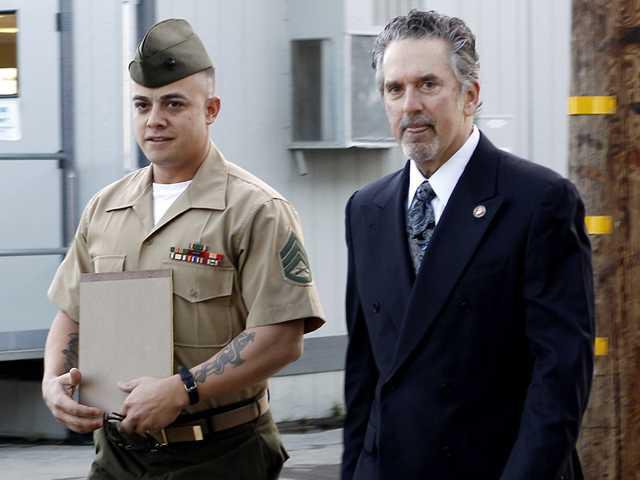CAMP PENDLETON, Calif. — The sergeant saw the charred and mangled remains of a fellow Marine killed by a roadside bomb only moments before he instructed his squad to "shoot first, ask questions later" in what would become one of the Iraq war's most horrific episodes of civilian deaths, military prosecutors say.
Both the prosecution and defense agree the bomb explosion that killed Lance Cpl. Miguel Terrazas in the Iraqi town of Haditha on Nov. 19, 2005, influenced Staff Sgt. Frank Wuterich's decisions that day.
The debate during the case's trial this month is over whether Wuterich reacted appropriately as a Marine squad leader in protecting his troops in the midst of a chaotic war or whether he went on a vengeful rampage, disregarding combat rules and leading his men to shoot and blast indiscriminately at Iraqi men, women and children.
In the end, 24 Iraqis were killed after the Marine squad cleared several homes in Haditha with grenades and gunfire that day.
At least one of Wuterich's squad members is expected to testify for the prosecution Tuesday, the second day witnesses will take the stand before the all-Marine jury at Camp Pendleton in one of the biggest criminal cases against U.S. troops to emerge from the war.
Prosecutors in their opening statement Monday implicated Wuterich in 19 of the 24 deaths, painting a picture of a young Marine with no prior combat experience losing control after seeing his friend's body blown apart.
They showed jurors — all of whom have combat experience in Iraq — graphic pictures of bodies, including the faces of men shot at mid-range who were in a car near the scene of the bomb attack, and described how Wuterich stood at the foot of a bed of a frightened woman and children in one of the home's back bedrooms and sprayed them with bullets.
Maj. Nicholas Gannon said the evidence will show Wuterich "never lost control of his squad ... but he made a series of fatal assumptions and he lost control of himself."
Wuterich is charged with nine counts of voluntary manslaughter.
He has said he regretted the loss of civilian lives but believed he was operating within military combat rules.
Wuterich's lawyers said the squad was under small arms fire and Wuterich believed insurgents were in the homes. Attorney Haytham Faraj asked jurors to apply their Marine Corps knowledge and combat experience and imagine how they would react after the deadly blast, blinded by the debris and believing to be under attack.
Faraj, a retired Marine, told the jury of four enlisted men and four officers that Wuterich's orders were meant to urge Marines not to hesitate in reacting.
He also told jurors not to be swayed by Wuterich's squad members who testify against him, accusing the government of buying them off by offering to dismiss the charges against them.
"You have a bunch of scared Marines promised immunity who are going to tell you about things that did not happen," Faraj said.
Wuterich, who has been working a desk job at Camp Pendleton awaiting the long-delayed trial, is the last of eight Marines initially charged. Six have had their charges dismissed or discharged. One was acquitted.
After the bomb blast, Wuterich and another Marine fatally shot five of the men before Wuterich ordered the squad to clear several homes.
Military investigators told jurors Wuterich told them repeatedly that he instructed his squad to "shoot first, ask questions later." Wuterich also admitted, three investigators testified on Monday, that he did not positively identify his targets.
Investigators said they were shocked to hear such a disregard of the rules for when to apply deadly force.
"It seemed to show a lack of discipline and that essentially there were no rules...and that concerned me," testified Army Lt. Col. David Mendelson, who helped to initially investigate the case. "For me it placed in context the rest of the day in terms of potentially why so many women and children got killed from there on out."
The killings in Haditha on Nov. 19, 2005, are considered among the war's defining moments, further tainting America's reputation when it was already at a low point after the release of photos of prisoner abuse by U.S. soldiers at Abu Ghraib prison.
A full investigation didn't begin until a Time magazine reporter inquired about the deaths in January 2006, two months after the incident.
The trial was delayed for years by legal wrangling over unaired outtakes of a 2007 interview Wuterich gave to CBS "60 Minutes."
Ultimately prosecutors won their right to view them. Parts of the interview were used in the prosecution's opening statements Monday, including when Wuterich said every Marine in his squad acted as ordered and did their job.

